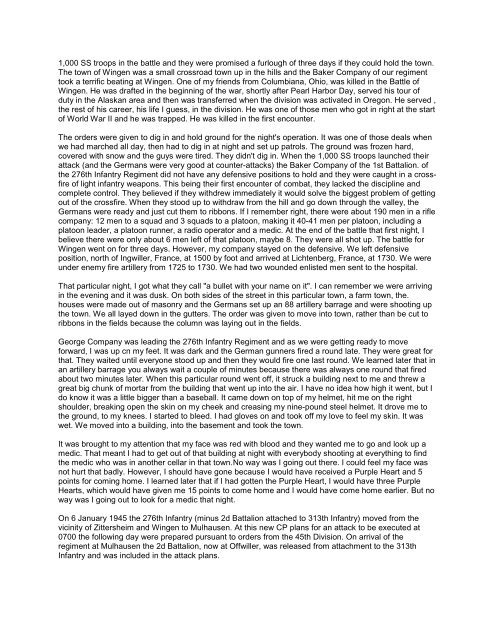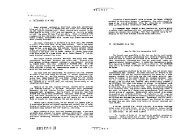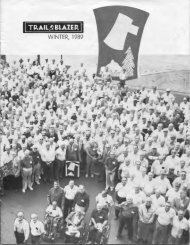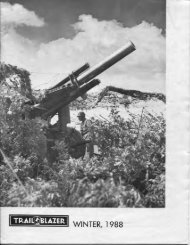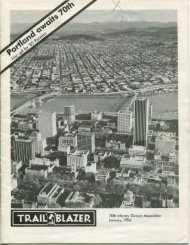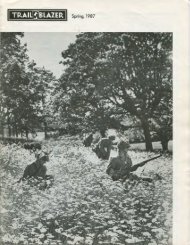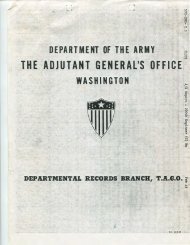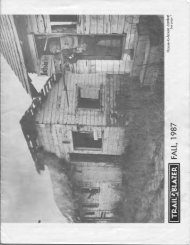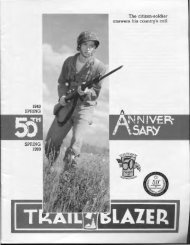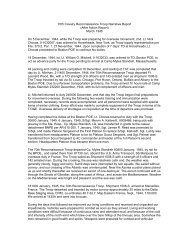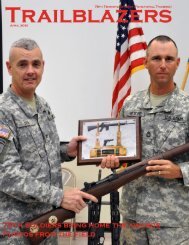Download - 70th Infantry Division Association
Download - 70th Infantry Division Association
Download - 70th Infantry Division Association
Create successful ePaper yourself
Turn your PDF publications into a flip-book with our unique Google optimized e-Paper software.
1,000 SS troops in the battle and they were promised a furlough of three days if they could hold the town.<br />
The town of Wingen was a small crossroad town up in the hills and the Baker Company of our regiment<br />
took a terrific beating at Wingen. One of my friends from Columbiana, Ohio, was killed in the Battle of<br />
Wingen. He was drafted in the beginning of the war, shortly after Pearl Harbor Day, served his tour of<br />
duty in the Alaskan area and then was transferred when the division was activated in Oregon. He served ,<br />
the rest of his career, his life I guess, in the division. He was one of those men who got in right at the start<br />
of World War II and he was trapped. He was killed in the first encounter.<br />
The orders were given to dig in and hold ground for the night's operation. It was one of those deals when<br />
we had marched all day, then had to dig in at night and set up patrols. The ground was frozen hard,<br />
covered with snow and the guys were tired. They didn't dig in. When the 1,000 SS troops launched their<br />
attack (and the Germans were very good at counter-attacks) the Baker Company of the 1st Battalion. of<br />
the 276th <strong>Infantry</strong> Regiment did not have any defensive positions to hold and they were caught in a crossfire<br />
of light infantry weapons. This being their first encounter of combat, they lacked the discipline and<br />
complete control. They believed if they withdrew immediately it would solve the biggest problem of getting<br />
out of the crossfire. When they stood up to withdraw from the hill and go down through the valley, the<br />
Germans were ready and just cut them to ribbons. If I remember right, there were about 190 men in a rifle<br />
company: 12 men to a squad and 3 squads to a platoon, making it 40-41 men per platoon, including a<br />
platoon leader, a platoon runner, a radio operator and a medic. At the end of the battle that first night, I<br />
believe there were only about 6 men left of that platoon, maybe 8. They were all shot up. The battle for<br />
Wingen went on for three days. However, my company stayed on the defensive. We left defensive<br />
position, north of Ingwiller, France, at 1500 by foot and arrived at Lichtenberg, France, at 1730. We were<br />
under enemy fire artillery from 1725 to 1730. We had two wounded enlisted men sent to the hospital.<br />
That particular night, I got what they call "a bullet with your name on it". I can remember we were arriving<br />
in the evening and it was dusk. On both sides of the street in this particular town, a farm town, the.<br />
houses were made out of masonry and the Germans set up an 88 artillery barrage and were shooting up<br />
the town. We all layed down in the gutters. The order was given to move into town, rather than be cut to<br />
ribbons in the fields because the column was laying out in the fields.<br />
George Company was leading the 276th <strong>Infantry</strong> Regiment and as we were getting ready to move<br />
forward, I was up cn my feet. It was dark and the German gunners fired a round late. They were great for<br />
that. They waited until everyone stood up and then they would fire one last round. We learned later that in<br />
an artillery barrage you always wait a couple of minutes because there was always one round that fired<br />
about two minutes later. When this particular round went off, it struck a building next to me and threw a<br />
great big chunk of mortar from the building that went up into the air. I have no idea how high it went, but I<br />
do know it was a little bigger than a baseball. It came down on top of my helmet, hit me on the right<br />
shoulder, breaking open the skin on my cheek and creasing my nine-pound steel helmet. It drove me to<br />
the ground, to my knees. I started to bleed. I had gloves on and took off my love to feel my skin. It was<br />
wet. We moved into a building, into the basement and took the town.<br />
It was brought to my attention that my face was red with blood and they wanted me to go and look up a<br />
medic. That meant I had to get out of that building at night with everybody shooting at everything to find<br />
the medic who was in another cellar in that town. No way was I going out there. I could feel my face was<br />
not hurt that badly. However, I should have gone because I would have received a Purple Heart and 5<br />
points for coming home. I learned later that if I had gotten the Purple Heart, I would have three Purple<br />
Hearts, which would have given me 15 points to come home and I would have come home earlier. But no<br />
way was I going out to look for a medic that night.<br />
On 6 January 1945 the 276th <strong>Infantry</strong> (minus 2d Battalion attached to 313th <strong>Infantry</strong>) moved from the<br />
vicinity of Zittersheim and Wingen to Mulhausen. At this new CP plans for an attack to be executed at<br />
0700 the following day were prepared pursuant to orders from the 45th <strong>Division</strong>. On arrival of the<br />
regiment at Mulhausen the 2d Battalion, now at Offwiller, was released from attachment to the 313th<br />
<strong>Infantry</strong> and was included in the attack plans.


